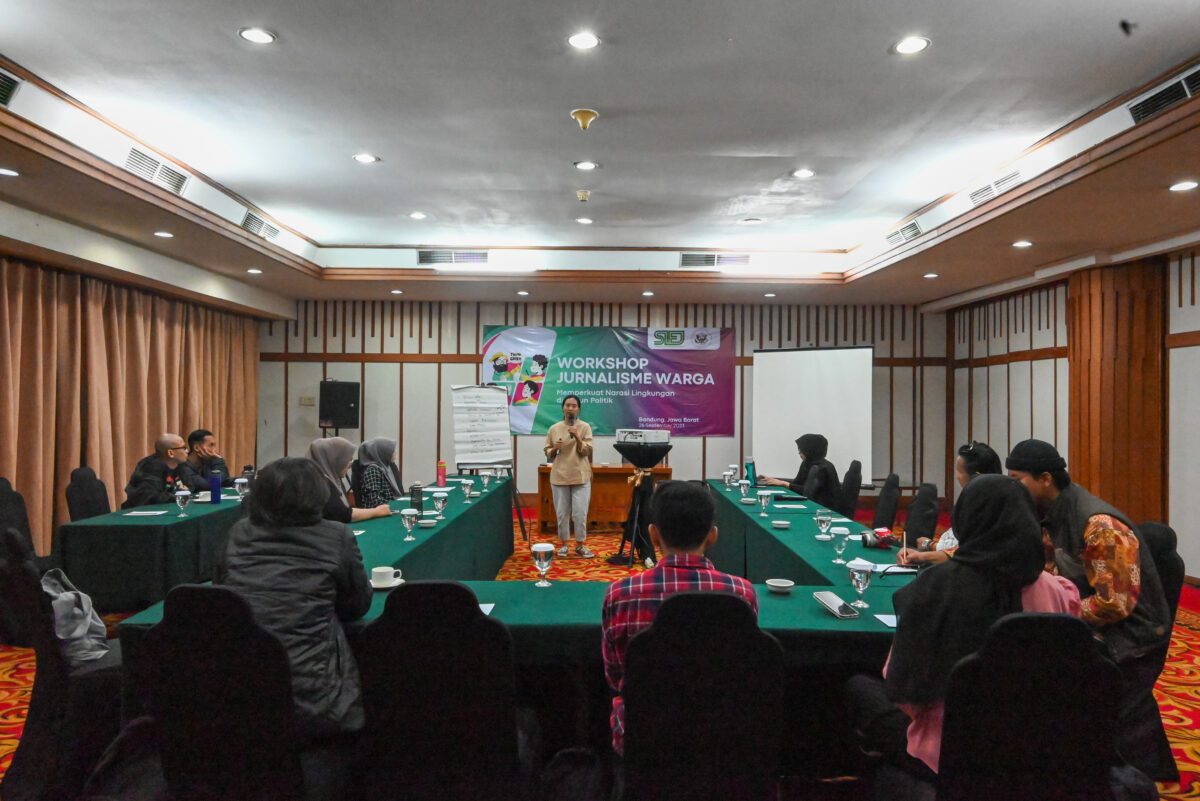Strengthening journalists’ literacy in climate and environmental issues and giving more space to youth in the media is believed to be critical as election year closes in.
The Society of Indonesian Environmental Journalists (SIEJ), supported by the US Embassy, conducted training for journalists and citizen journalists to strengthen the narrative of environmental issues in the election year.
A total of 20 journalists and citizen journalists from various cities in West Java gathered at the Savoy Homann Hotel, Jalan Asia Afrika in Bandung from Tuesday-Wednesday, September 26-27, 2023. Participants received training related to environmental issues and how to convey them to the public so that they can become a common concern.
Present as speakers were the Head of the Meteorology Department of Institut Teknologi Bandung (ITB) Muhammad Rais Abdillah, Director of Yaksa Pelestari Bumi Berkelanjutan (YPBB) Fictor Ferdinand, Director of Ekuatorial Asep Saefullah, and Executive Director of SIEJ Alwan Ridha Ramdhani.
On the second day, participants attended a hearing between journalists, citizen journalists, election organizers, young politicians, and political observers.
The Bandung event was the last in a series of similar training held in Sorong, Kupang, Medan, and Surabaya.
SIEJ Chairman Joni Aswira said the SIEJ Congress held this year was mandated to strengthen environmental issues in the election year and invite the public, activists, and journalists to actively oversee this issue.
We hope that environmental issues and climate crises will be discussed and addressed by candidates for presidential, regional, and legislative elections in 2024.
Joni Aswira, Chairman of the Society of Indonesian Environment Journalists (SIEJ)
Aswira underlined a statement by the Indonesian Ministry of Finance. This statement said Indonesia has the potential to experience losses of up to Rp112.2 trillion due to the climate crisis throughout 2023. A climate crisis that causes floods and other disasters disrupts supply chains, resulting in inflation. This does not include society’s social and health costs.
According to a survey conducted by YouGov, a UK-based market research and data analysis company, Indonesia ranks high amongst countries with the most climate deniers. This survey was conducted from July 30 to August 24, 2020, involving 26,000 respondents from 25 countries.
It is imperative to encourage Indonesians, especially the younger generation, to better understand and care about the environment in which they live and the problems that plague it.
The young generation, especially millennials and Generation Z, will dominate the votes in the 2024 Presidential Elections (Pilpres), Legislative Elections (Pileg), and Regional Head Elections (Pilkada). They will determine the political future of the nation, including the environment’s future and the handling of climate crisis issues.
From the 2019 Simultaneous Election Permanent Voters List (DPT), there are 17,501,278 voters aged 20 years, while those aged 21-30 years are 42,843,792 people. For the 2024 election, millennial and Generation Z voters are expected to increase to around 60% of the total vote.
This demographic makes the political year an important opportunity to strengthen environmental issues among the younger generation and society at large.
“We hope that environmental issues and climate crises will be discussed and addressed by candidates for presidential, regional, and legislative elections in 2024,” said Aswira.
One of the efforts to strengthen environmental issues can be done by strengthening media literacy on climate and environmental issues in various regions. This involves mainstream media, community media, and youth conservation activists. It is important to improve their ability to use new media platforms to raise climate and environmental issues in their regions.
Media and journalists should collaborate with youth on climate action. “It is critical to give more space to youth voices in the media. They should be encouraged to become opinion leaders, representing various communities to speak out and demand climate commitments from politicians in their respective regions,” Joni said.
Read also: Youth behind push for climate adaptation in East Flores
The workshop was held in five cities experiencing environmental damage, natural resource investment areas, and areas with human rights violations, disasters, and social inequality.
“The hope is that journalists and citizen journalists will encourage commitment from election organizers and local politicians to bring local issues related to the environment onto the political agenda,” said Aswira.
On the second day, participants are scheduled to attend hearings with election organizers and politicians. This activity is expected to push the narrative of the climate crisis and environment-related issues into the campaigns and debates of candidates for regional heads, build as many narratives of climate and environmental issues among politicians, and build collaboration and knowledge sharing between journalists and communities of environmental activists.
The hearing is planned to be attended by West Java PKS DPW Chairman Haru Suandharu and Indonesian Solidarity Party (PSI) DPP Chairman Furqan AMC. Also present will be the West Java General Elections Commission and Elections Supervisory Body, a political observer from Padjajaran University Firman Manan, and senior journalist Nursyawal.
